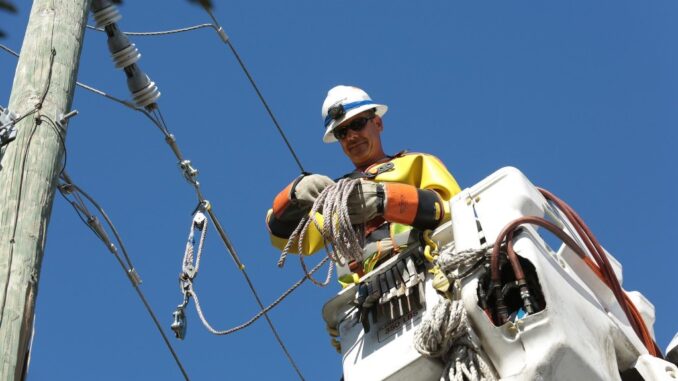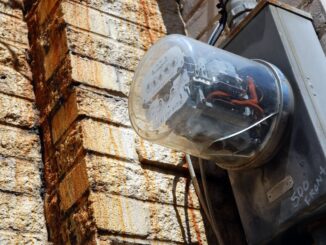
Correction: The Ohio Consumers’ Counsel is Maureen Willis. A previous version of this story misstated her name.
Last year was the eighth in a row that at least one of Ohio’s regulated electric utilities failed to meet one or both company-specific reliability standards set by the Public Utilities Commission of Ohio.
Companies providing service to a majority of Ohio ratepayers also missed one of their marks last year.
These utilities’ track records suggest consumers aren’t getting full bang for their buck, even as they’re charged millions for riders purportedly for grid improvements, vegetation management and other work.
“AEP Ohio has been investing hundreds of millions of dollars in its distribution to improve reliability,” said company spokesperson Scott Blake, commenting on the PUCO’s slightly stricter standards for the company starting in 2019, compared to those from 2013. “These investments are making stricter performance standards more achievable.”
Yet AEP Ohio failed to meet its standard last year for how long it takes to get power back on when outages affect customers.
All Ohio utilities reduced the frequency of their outages per customer last year compared to 2021 and 2022. But Duke Energy Ohio still failed to meet that standard. AEP Ohio and FirstEnergy’s Cleveland Electric Illuminating Company and Toledo Edison meanwhile failed to hit their targets for how long it takes to restore customers’ power after outages.
Prolonged outages can lead to spoiled food, loss of heating and air conditioning, interruptions to business, inability to use power for electronics and more. Those problems in turn can threaten people’s physical or financial well-being. Additionally, ongoing climate change poses continuing challenges for the electric grid’s reliability and resilience.
“Regulators of course are interested in utilities’ performance in delivering safe and reliable power,” said Matt Schilling, spokesperson for the Public Utilities Commission of Ohio.
Toward that end, the agency sets two company-specific reliability standards for each electric utility, using common metrics in the electric industry. Utilities must file reports each spring showing how they performed on each metric in the prior year.
One standard refers to the average time outages last for customers who experience them, measured in minutes. It’s called the Customer Average Interruption Duration Index, or CAIDI. The other is the average number of outages per customer systemwide. It’s known as the System Average Interruption Frequency Index, or SAIFI.
If a utility fails to meet the SAIFI metric, “it means they are having too many outages occurring,” said FirstEnergy spokesperson Lauren Siburkis. “And if they fail at meeting CAIDI, it means they are taking too long to restore [power] when there is an outage.”
The metrics allow period-to-period comparisons so a company can track its improvement over time, she added.
The PUCO’s rules exclude major outages, such as those due to some extreme weather events, in determining whether companies met or missed their regulatory reliability standards, although the annual reports include the data both before and after the exclusions. Yet the “customer minutes interrupted,” which did count toward the reliability standards, added up to more than 1,000 years of power loss for individual customers last year.
Eight years in a row
The four utilities that failed to meet one of their standards last year provide power to more than half of Ohio’s electricity customers. The Energy News Network’s data review shows at least one Ohio utility also missed meeting a standard every year going back to 2016.
In 2022, CEI and AES Ohio both missed their standards for the average duration of customer outages, and Duke missed its standard for the average frequency of outages in 2021 and 2022.
AES Ohio failed to meet its standard for the average length of customer outages for four years in a row, from 2019 through 2022, but spokesperson Mary Ann Kabel said the situation is improving.
“The company’s CAIDI has improved every year since 2019, and we’re committed to providing safe and reliable service,” she said.
Before that, in 2018, AEP missed on both of its performance standards. Duke Energy Ohio missed on both of its standards in 2017. And in 2016 Duke missed on its standard for the average time customers with outages went without power.
When companies fail to meet either of their reliability standards in the prior year, regulators require them to provide reasoning and a plan to address those issues. The Ohio Administrative Code says missing the same standard for two years in a row counts as a violation. Violations can result in penalties, corrective action, or restitution to customers.
Utilities’ ability to meet their performance standards depends on multiple factors, Schilling said. All have programs to trim vegetation within their rights-of-way, but vegetation outside that area also can interfere with power lines and equipment.
“Other factors like aging infrastructure and maintenance can cause outages,” Schilling said, although “utilities routinely invest to update and maintain their systems.”
Additional causes include damage from wildlife or motor vehicle crashes, some of which may be out of utility companies’ control.
Extreme weather played a role in Duke’s miss on the frequency standard last year. Three big storms in July 2023 bumped up the number of outages, even though the storms didn’t meet criteria for excluded events, the company’s filing said.
FirstEnergy’s action plan filed in April pointed to line and equipment failures and to trees as reasons why CEI and Toledo Edison didn’t meet their standards last year. Toledo Edison and CEI plan to conduct thermal scans of their worst performing circuits and additional work to upgrade lightning protection and other equipment in places where customers have multiple outages. Other work aims to prevent tree-related problems.
“Tree-related outages are a top contributor to outage durations because of the need to safely remove the vegetation prior to starting repair work,” Siburkis said, “so the tree-related work in the plan will have a positive impact, even during major events.”
Vegetation management was also part of AES Ohio’s work when it failed to meet its outage duration standard. The company’s action plan filed in 2023 said the company was working to install stronger poles and make other improvements “to reduce the severity of storm outages.” Smart grid deployment was also part of the company’s plan, along with a revision of its reliability standards.
AES Ohio’s updated standards took effect last year. They allow nearly seven minutes longer for restoring service to customers when they lose power, but require a slightly lower average frequency for outages. A slightly lower SAIFI standard would reflect an expectation for there to be fewer outages in the first place.
AEP Ohio blamed arithmetic for its failure to meet the outage duration standard last year. Smart grid work eliminated various shorter outages, the company reported. But a smaller number of service interruptions pushed up the average duration for outages that did occur.
“AEP Ohio’s CAIDI score has gone up not because AEP Ohio’s performance on longer outages has gotten worse, but rather because AEP Ohio has been able to eliminate shorter outages that had been keeping the CAIDI average down,” Blake said.
An additional industry metric, known as SAIDI, for System Average Interruption Duration Index, divides the number of outages by all customers, whether they lost power or not. Using that metric makes it look like AEP Ohio outperformed by more than 25%, according to data in the company’s filing.
House Bill 260, sponsored by Republicans Bill Seitz of Cincinnati and Monica Robb Blasdel of Columbiana, would swap out SAIDI for CAIDI.
Seitz initially said he didn’t know how reliability was currently calculated. Then in a follow-up email he said he had been informed a switch “would better incentivize utilities to meet the reliability demands of customers,” adding an opinion that the installation of smart meters and other work to reduce outages makes the CAIDI standard “obsolete.”
“It’s meaningless if you don’t have both” of the current standards, said Ashley Brown, a former PUCO commissioner, adding that decisions about reliability standards are best left to regulators, not the legislature.
The bill’s proposal to change the metric “diminishes the importance of individual consumer outages,” said Ohio Consumers’ Counsel Maureen Willis. “Other changes being proposed weaken the reliability standards by excluding more outages from being part of the reliability assessment,” she added.
Take the Survey at https://survey.energynewsbeat.com/
Crude Oil, LNG, Jet Fuel price quote
ENB Top News
ENB
Energy Dashboard
ENB Podcast
ENB Substack






